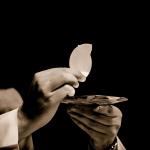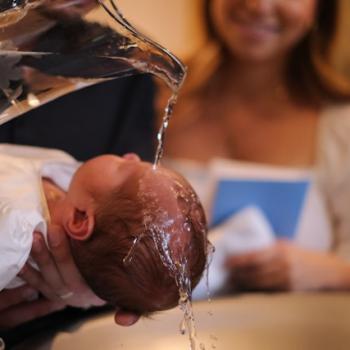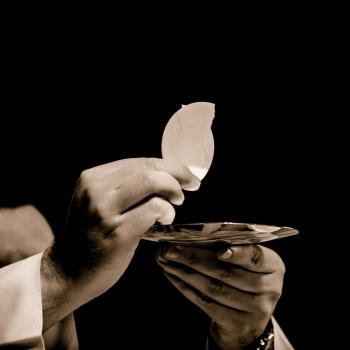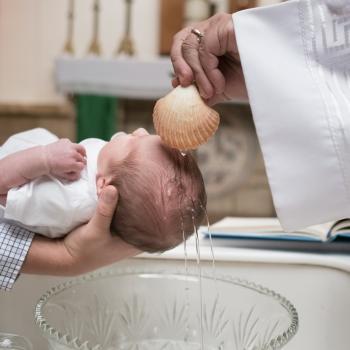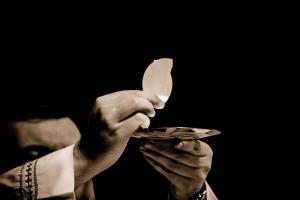
We are celebrating seven baptisms today! And you might think that this would be a good day to take a break from talking about the Eucharist and focus on baptism instead.
That’s not surprising. For a lot of our brothers and sisters, baptism and the Eucharist seem to be completely unrelated.
If you think about it, the dominant Protestant voice in the larger church has left a lot of people with the impression that the Christian spiritual pilgrimage looks like this:
Step one: You wander through life “in sin”, without a relationship with God, until you become an adult.
Step two: When you finally become aware of the fact that you are a sinner, you feel guilty, you have a crisis, you ask Jesus to save you, and – then – as a symbol of that discovery, you get baptized.
Step three: You hold on for dear life. You go to church. You don’t kick the family’s dog. And once a quarter, you celebrate communion to remind you that Jesus died for your sins back in step two.
Step four: Then you die and – hopefully – you go to heaven.
The basic principle behind this way of thinking is what is called “positional righteousness”. That is, the most important thing you will ever do spiritually is to believe in Jesus, so that your name is moved from the column, “dead and going to hell” to “dead and going to heaven.
That isn’t the way that we think about it in the Anglican and Episcopal tradition. To use the same way of thinking about it, so that the differences stick, we believe that:
Step one: You were born with the image of God, stamped on your very way of being. But, because we want to be our own God and remake our lives in our own image, we aren’t always clear what it means to bear God’s image and we don’t always live into that reality.
Step two: If you are born into a Christian home, your parents give you to God as a baby and you are made a part of Christ’s body in your baptism. This doesn’t mean trusting Jesus or what you believe isn’t important. It is. And, in fact, in your confirmation, you are asked to affirm your faith.
But we follow the pattern of the early church. If you believe, you get baptized. If you get baptized you (or your family, on your behalf) need to believe.
By the way: If you weren’t baptized as an infant, and it takes you longer to find Jesus, that happens later, and — yes, of course — we baptize adults.
Step three is more complicated, too: You see, we don’t think that once you become a part of Christ’s body that you are here just to hang out and try to keep from going to hell.
We believe in “realized righteousness” not “positional righteousness”. That means that when you are baptized, you start a journey into God in Christ. You can grow and change.
Or, to put it another way, you are made a “little Christ” in your baptism and God gives you more and more of his Son, until you are the very fullest version of your Jesus-filled self.
This is why we receive the Eucharist every week, and we eat the flesh of Jesus and drink his blood. We are becoming Jesus filled, here at church and as the words of dismissal at the end of the service reminds us, we go out there into the world as our Christ-filled selves. That is the lifelong journey that we are on.
Oh, and step four? When we die, then, we continue the journey and we become our fullest, Christ-filled selves.
Now, as you can imagine, this includes a very different view of the Eucharist, and in our series, we have already talked about some of those differences:
- In our tradition, the Eucharist is not just symbolic,
- It is an enactment of a new reality
- We don’t just remember the first supper, we re-present the first supper
- We don’t just believe that Jesus is spiritually present in the Eucharist
- We believe that the bread and wine are the body and blood of Jesus
But when we realize that the Eucharist is a continuation of the spiritual journey that begins with our baptism, it is clear that there are other differences as well.
One – obviously – is that baptism and the Eucharist are inseparable. Of the church’s seven sacraments – baptism, confirmation, eucharist, reconciliation, holy matrimony, unction and ordination – three – baptism, confirmation, and eucharist – are all about the Christian journey. They mark the beginning of the journey, personal affirmation of our commitment to Christ, and the on-going nurture of Christ’s grace in our lives.
For that reason, it is also clear that baptism without the eucharist and eucharist without baptism makes no sense. Based on what we believe about the sacraments one without the other, is like saying, “I can tell you where our journey begins but I don’t know where it goes” or “I know what you do when are already a Christian but I can’t tell you where the journey begins.”
We tell a story with the sacraments – a story about who God is, about who we are, about what God has done for us, about how he makes that gift available to us, and about who we can become. You will hear references to the Trinity; to God’s creative, redeeming, and sustaining work; the challenge of sin and evil; to the calling of Israel; to the Exodus; to the conquest of death in the cross and resurrection of Jesus his Son; to the role of the church; and to the promise of new life in Jesus Christ, our Lord. Take any chapter out of that story and it no longer makes sense.
Of course, this way of thinking about baptism and the Eucharist also explains why we offer the Eucharist to baptized Christians and encourage others to receive a blessing.
In recent years, there have been a growing number of people who argue that the church should give the Eucharist to anybody and everybody, whatever they may – or may not – believe, what ever journey they may – or may not – be on. And, in order to make sense of that approach, a small but vocal number of clergy have argued that we rebrand the Eucharist, treating it as a sacrament of welcome, a sign of God’s love for the world.
At first blush, this sounds attractive. Not least of all because it gets both clergy and Christians off the difficult business of suggesting that we, as human beings, are in spiritual peril and that our healing and well-being depends upon choosing to follow Jesus.
But this rebranding of the Eucharist as a sign of God’s love for humankind reorders the chapters of the story that the Sacraments tell. It empties the Gospel of its challenge and – in doing so – empties it of its power as well. And it ignores the same challenge and hope that characterized the teaching of Jesus himself.
Yes, he was welcoming. He declared the presence of the Kingdom and the immeasurable mercy of God.
Significantly, though, Jesus did not come to tell humanity, “I’m OK, you’re OK.” His message was never, feel free to stay where you are or go on doing what you like.
He confronted the power of sin and evil in the desert. He called on people to acknowledge their own sin and repent. And when he called people to follow him, echoing the Exodus and God’s calling on the people of Israel, he made it clear that his hearers had a choice as well. And when – after his Resurrection – Jesus told his disciples to go into the world, baptizing people in the name of the Father, the Son, and the Holy Spirit, he was instructing them to issue the same challenge.
Is this a justification for holding people at arm’s length? No. And we don’t. You don’t need to curate your social media page or hide your struggles. You are welcome here, wherever you might be in your search for God and for healing.
Are we trying to protect the church from the world? Of course not. We are ready to talk openly about the needs of the world and the challenges we all face – in our nation, at work, at home, in the depths of our personal lives. And we seek to meet those needs.
But in attending closely to the story that the sacraments tell, we are safeguarding the mercy and grace that they offer. None of us need the church as institution. We need what the church is called to be, the body of Christ. None of us need the institution’s reassurances. We need what the church is called to preach and the sacraments she is called to offer. And, ultimately, none of us need to hear what we would like to hear. We need the truth about ourselves, a vision of the enormity of God’s love, and the promise of life eternal in his Son.
This is who we are meant to be. This is our message and the message of the sacraments.
Let us pray:
Blessed are you, our Lord and our God. Blessed are you for the gifts of baptism and the Eucharist. For the path of salvation and the way of peace. Blessed are you for the gifts of water, oil and light, for the gifts of your body and your blood. Receive the thanksgiving of our grateful hearts. Lead us in the path to healing, mercy, and truth that you have established. And in the gift of your sacraments, deepen our own journey. In the name of your Son, our Savior, Jesus Christ, who with you and the Holy Spirit, reign one God, now and forever. Amen.


